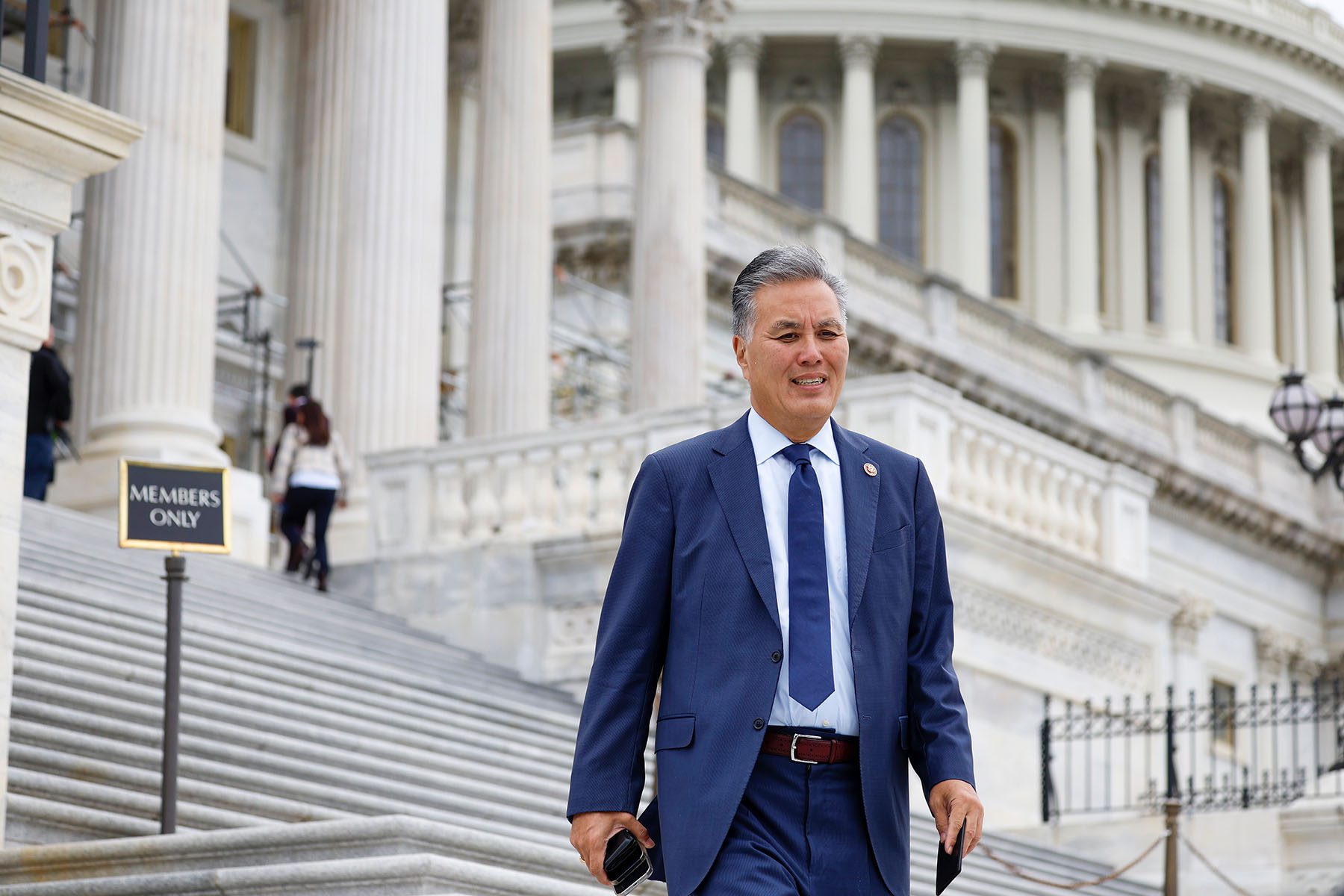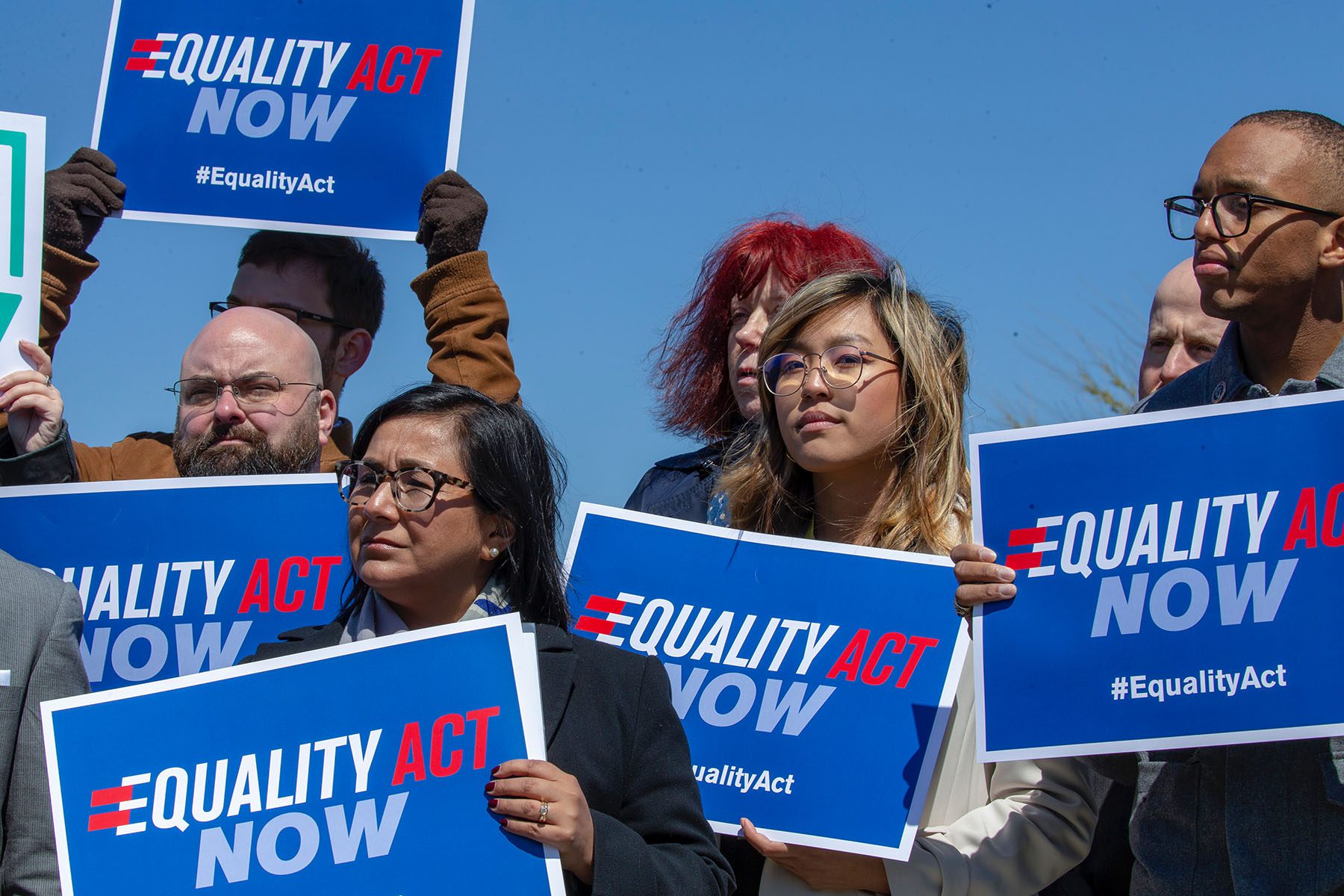We’re answering the “how” and “why” of LGBTQ+ and politics news. Sign up for our daily newsletter.
In 2015, LGBTQ+ rights advocates joined forces to form Freedom for All Americans (FFAA), an alliance tasked with a single goal: to pass the Equality Act and shore up nondiscrimination protections for LGBTQ+ people nationwide.
Now, after eight years of lobbying the bill, the group is shuttering. The move ends the largest funded campaign to pass federal nondiscrimination protections for LGBTQ+ Americans, a dream of the movement that has stalled for 49 years.
“As the sun set on Congress in 2022, so too it sets on FFAA’s campaign,” the group said in a statement on its website. Group members declined multiple requests for interviews from The 19th.
FFAA was launched in the wake of the Supreme Court’s Obergefell v. Hodges decision, which granted marriage equality to LGBTQ+ couples nationwide. Anticipating the election of Hillary Clinton to the presidency, advocates planned on running the campaign for just a few months. Instead, Donald Trump, who would make eroding LGBTQ+ rights a hallmark of his time in office, won the election.
Freedom for All Americans wasn’t ready to give up, however. Over the next four years, the group continued to push for the Equality Act and battled the Trump administration on major queer issues, including when federal protections for transgender youth were rolled back and when the Pentagon banned transgender people from openly serving in the armed forces.
In 2021, FFAA had an annual revenue of more than $2.8 million, and its financial arm — Freedom for All Americans Education Fund — reported more than $6.2 million, according to the latest IRS data. The group has signaled it will redistribute its funding to other legacy LGBTQ+ advocacy organizations.
-
More LGBTQ+ and politics coverage
- Exclusive: Trans students and their parents ask Education Department leaders to help them fight anti-LGBTQ+ bills
- Exclusive: Democrats reintroduce federal Trans Bill of Rights as GOP tries to advance restrictions
- Nebraska filibuster over trans rights echoes Wendy Davis’ 2013 abortion standoff
“It is our deepest hope that the movement will take the relationships and coordinating structures that were built and the lessons learned and leverage them to continue to build toward the moment of next opportunity,” the organization said in a statement.
LGBTQ+ advocates have long argued that the Equality Act is critical to cementing some of the most basic and long-delayed rights for queer Americans by outlawing anti-LGBTQ+ discrimination in housing, public accommodations, schools, jury service and other areas of life nationwide. According to the Movement Advancement Project, which tracks LGBTQ+ policy, nearly 30 percent of Americans still live in states where it is legal to deny housing to a queer person based on their gender identity and/or sexual orientation. Twenty-states and four territories have laws that allow businesses to turn LGBTQ+ people away because of who they are.
The bill’s best shot appeared to come in 2021 after the election of President Joe Biden and a Democratically controlled Congress. But Democrats failed to gain enough Senate seats to move the bill, and despite Biden’s campaign promise to pass the Equality Act in his first 100 days in office, the measure has stalled in the Senate.
Mainstream LGBTQ+ organizations will continue to push for the Equality Act, which was first introduced to Congress by Rep. Bella Abzug in 1974. Rep. Mark Takano of California, a Democrat and co-chair of the Congressional Equality Caucus, announced last month that he would lead the continued push for the bill’s passage by introducing it in the 118th Congress.
“Being the first openly gay person of color elected to Congress gives me a unique point of view on the impact of discrimination in the lives of the American people,” Takano said in a statement. “As the grandson and son of a family incarcerated during World War II, and as a person who grew up knowing my identity could put my employment at risk and deprive me of the right to marry the person I love, I am acutely aware of the ways lawful discrimination can deform the trajectory of someone’s life.”

Despite these efforts, the landmark legislation is all but certain to fail in the immediate future while Republican lawmakers control the House of Representatives.
In addition to continuing to push for the Equality Act, FFAA also went to the mat over precedent-setting issues in states from coast to coast.
When Massachusetts went to the ballot box to consider the nation’s first statewide measure striking down transgender protections in 2018, FFAA was at the forefront of the fight to uphold those protections. That campaign was ultimately successful, and advocates hoped it was a harbinger for other statewide battles on the horizon. But that was not the case: Since 2020, statehouses across the country have passed a blitz of anti-LGBTQ+ legislation, with most of the bills targeting transgender youth.
Rep. David Cicilline of Rhode Island, a Democrat and author of the Equality Act, said it is “past time” for Congress to outlaw discrimination against the queer community, particularly as “homophobic and transphobic legislation” continues to be introduced in statehouses across the country.
“It is a national embarrassment that the LGBTQI+ community remains the only marginalized group in the United States that can legally be discriminated against, and we are seeing the consequences play out at every level of government,” Cicilline said in a statement.
The dissolution of FFAA comes at a trying time LGBTQ+ advocates. Anti-LGBTQ+ legislation is being introduced and passed in states at a blistering pace that has all but upended the momentum of the LGBTQ+ rights movement.
Dr. Kellan Baker, a veteran advocate and LGBTQ+ health expert at the Whitman-Walker Institute — a health center known for its focus on LGBTQ+ health care, resources and medical training — said the Equality Act is needed now more than ever.
“I think there was an opportunity missed in 2015 and 2016 for a lot of queer and trans people with various kinds of privilege to recommit themselves to a longer-term fight for racial, reproductive and economic justice,” Baker said. “Because there was a desire to believe that the fight had been won.”
Kelley Robinson, the president of Human Rights Campaign, the largest LGBTQ+ political lobbying organization in the country, said there will still be a relentless push to extend protections against discrimination.
“There is overwhelming support for this bill among the American people and the business community, and we will continue fighting until this bill is signed into law,” Robinson said in a statement.






